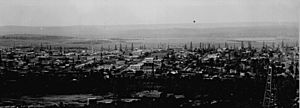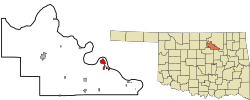Cleveland, Oklahoma facts for kids
Quick facts for kids
Cleveland, Oklahoma
|
|
|---|---|

Panoramic view of Cleveland in 1905, a year after the discovery of oil
|
|
| Nickname(s):
Oklahoma's Pioneer Oil City
|
|

Location within Pawnee County and Oklahoma
|
|
| Country | United States |
| State | Oklahoma |
| County | Pawnee |
| Area | |
| • Total | 2.69 sq mi (6.96 km2) |
| • Land | 2.68 sq mi (6.95 km2) |
| • Water | 0.00 sq mi (0.01 km2) |
| Elevation | 791 ft (241 m) |
| Population
(2020)
|
|
| • Total | 3,205 |
| • Density | 1,194.11/sq mi (461.03/km2) |
| Time zone | UTC-6 (Central (CST)) |
| • Summer (DST) | UTC-5 (CDT) |
| ZIP code |
74020
|
| Area code(s) | 539/918 |
| FIPS code | 40-15350 |
| GNIS feature ID | 2409481 |
Cleveland is a city located in Pawnee County, Oklahoma, in the United States. In 2020, about 3,205 people lived there. It's known as "Oklahoma's Pioneer Oil City" because of its history with oil.
Contents
History of Cleveland
How Cleveland Began
After a large area called the Cherokee Outlet was opened for settlement, a person named Willis H. Herbert started a town. He opened a post office there on October 28, 1893. This first town was named Herbert.
However, the Post Office department later decided not to approve the Herbert post office. So, the post office was moved a short distance away. On April 19, 1894, it reopened under a new name: Cleveland. The town was named after the President at that time, Grover Cleveland. By 1900, Cleveland had a population of 211 people.
Oil Discovery and Growth
Before oil was found, Cleveland was a trading hub. Farmers and the Osage Tribe, who lived nearby, would come to trade goods.
In 1904, a railroad line reached Cleveland. This railroad, first called the Missouri, Kansas and Oklahoma Railroad, helped connect Cleveland to other places. On May 27, 1904, the first oil well was drilled near the town. This discovery brought many oil workers and other people to Cleveland. By 1907, when Oklahoma became a state, Cleveland's population had grown to 1,441 residents.
Cleveland's Location
Cleveland is a city with a total area of about 2.6 square miles (6.96 square kilometers). Most of this area is land, with a very small part being water.
Population Over Time
The number of people living in Cleveland has changed over the years. Here's a look at the population counts from different years:
| Historical population | |||
|---|---|---|---|
| Census | Pop. | %± | |
| 1900 | 211 | — | |
| 1910 | 1,310 | 520.9% | |
| 1920 | 2,717 | 107.4% | |
| 1930 | 2,959 | 8.9% | |
| 1940 | 2,510 | −15.2% | |
| 1950 | 2,464 | −1.8% | |
| 1960 | 2,519 | 2.2% | |
| 1970 | 2,573 | 2.1% | |
| 1980 | 2,972 | 15.5% | |
| 1990 | 3,156 | 6.2% | |
| 2000 | 3,282 | 4.0% | |
| 2010 | 3,251 | −0.9% | |
| 2020 | 3,205 | −1.4% | |
| U.S. Decennial Census | |||
In 2000, there were 3,282 people living in Cleveland. About 30.9% of the homes had children under 18. The average age of people in the city was 38 years old.
Historic Places to See
Cleveland is home to the Mullendore Mansion. This beautiful house was built in 1910. It has a special Greek Revival style and is located at 910 N. Phillips St.
Fun in Cleveland: Parks and Recreation
Cleveland is right next to Keystone Lake, which is a great spot for outdoor activities. There's also Cleveland City Lake, located about 7 miles west of town.
The city's Parks and Recreation Department takes care of three parks. These parks offer more than 50 picnic areas, 3 tennis courts, and 1 gymnasium for everyone to enjoy.
Famous People from Cleveland
Many interesting people have connections to Cleveland:
- Robbie Nichols was a linebacker who played football for the Baltimore Colts.
- David Bivin is a well-known author.
- Tony Perkins graduated from Cleveland High School in 1981. He later became the president of the Family Research Council and served in the Louisiana House of Representatives.
- Billy Vessels was born in Cleveland in 1931. He played football for the Cleveland Tigers. Later, he became a star player at the University of Oklahoma and won the Heisman Trophy in 1952.
See also
 In Spanish: Cleveland (Oklahoma) para niños
In Spanish: Cleveland (Oklahoma) para niños
 | Valerie Thomas |
 | Frederick McKinley Jones |
 | George Edward Alcorn Jr. |
 | Thomas Mensah |

